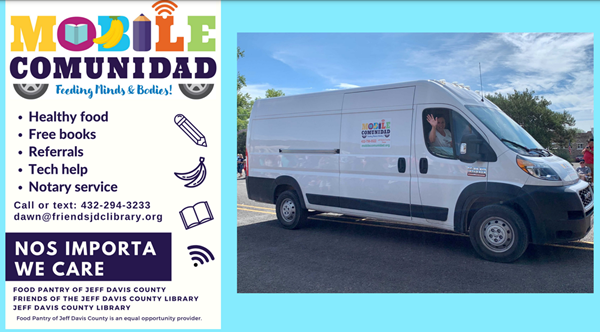Public Health is Part of Library Outreach
Dispatches from the 2021 Association of Bookmobile & Outreach Services Conference
Outreach efforts in the public library increasingly center around building, sustaining, and leveraging community partnerships, including with public health partners. That fact was evident at the 2021 Association of Bookmobile & Outreach Services’ (ABOS) Virtual Conference, held October 11-15. The conference featured at least six sessions focused on outreach librarians working with public health partners, including:
- Mobilizing partnerships, featuring Jeff Davis County Library’s efforts to create a new outreach vehicle called “Mobile Comunidad: Feeding Minds & Bodies,” through partnerships in rural West Texas
- Social Worker in the Library, AMITA Health, featuring the Chicago Public Library’s outreach partnerships, which led to the creation of the “Social Worker in the Library program”
- Growing Partnerships, featuring High Point (NC) Public Library’s work over the past decade working with a wide variety of partners to grow a Teaching Garden on the library’s property
- Nontraditional Library Services, featuring Charleston County (SC) Public Library’s work with local and state partners to increase access to food and telehealth
- Outreach to Seniors: Cultivating Relationships and Developing Support Initiatives, featuring Plano (TX) Public Library’s partnerships with groups as heterogeneous as the Alzheimer's Association and “local wellness and fitness groups”
- Stories to Go Literacy Enrichment Program, featuring Springfield-Greene County (MO) Library District’s participation in and support of “food pantry and community meal site programs”
During the ABOS conference, I was struck by the fact that none of these sessions explicitly mentioned public health in the session titles (the closest: Social Worker in the Library). The session titles instead focused on the foundational work of the outreach librarian: growing and leveraging partnerships, providing outreach to youth and older adults, and developing new types of library services.
A lesson I glean from this is that when we think of public health in the public library, we do not need to put it in in a separate box, off by itself. We instead need to start thinking about how public health is a natural part of outreach services. This is work libraries are already doing when we take story programs to food pantries and community meal sites (Springfield-Greene County), or when we add food distribution to our bookmobile routes (Jeff Davis County) or when we use our outreach to bring back to our library new, life changing services (Chicago).
In each of the sessions, I noted that the libraries naturally weave public health into their daily work in ways that are both organic and extend over a period of time.
Path to Mobile Comunidad
Nowhere is that more visible than in the “Mobilizing partnerships” presentation, featuring an extremely rural county in West Texas that, according to library director Gwin Grimes, has only “1 person per square mile.” The county has one medical clinic, one grocery store, no social services, no daycare, and access to many services requires a drive of between 24 to 300 miles.
In this context, Gwin and the Jeff Davis County Public Library started scheming with those health organizations that were present in her community, including the Food Pantry of Jeff Davis County.
The partnership’s first project was a Kids Pantry, started in 2019. According to Gwin “If you are a hungry kid you can stop by the library and get food.” (Learn more about library food pantries from the Collaborative Summer Library Program in Library Pantries Feed Communities! - pdf.) The success of the Kids Pantry prompted the partners to ask what more they could do to serve the rest of this far-flung county. The library had wanted, for years, to start a bookmobile, and through their new partnerships, and with the Friends of the Library as the fiscal agent, they were able to pull together the pieces to launch Mobile Comunidad.
Social Worker in the Library
In urban Chicago, a similar story can be seen in the Social Worker in the Library (SWIL) session. In that session, library social workers Margaret Ann Paauw and Celina Cantu discussed SWIL, and the history and current state of this Chicago partnership, which also includes Evanston Public Library.
Margaret Ann started working at the library in 2018, and Celina joined in 2020. SWIL services include providing essential social services on site and also doing outreach. Celina said that as a library social worker she has “had the opportunity to be pulled into some City-led initiatives that are focused on reinvesting in the West Side of Chicago: This involves outreach initiatives and specifically opioid-related outreach.”
What I found fascinating about this story is that so often, when we think of library social workers, we presume those services to be provided at the library location. Celina really showed that library social workers, in doing outreach off site, represent the library, essentially as outreach library workers themselves.
The outreach and partnerships, specifically between the Chicago Public Library and “AMITA Health, an interfaith health system,” led to the SWIL program, and then those social workers in turn extend the outreach capacity of the library. Celina and Margaret Ann discussed their approach to community outreach, and their social work style, which includes getting to know other local service providers, keeping a list of resource contacts, and maintaining connections with the community of service providers.
Noah Lenstra is an assistant professor of Library and Information Science at the University of North Carolina at Greensboro. He is an active member of the Association for Rural and Small Libraries and Association of Bookmobile & Outreach Services, and in 2016 started Let’s Move in Libraries.

